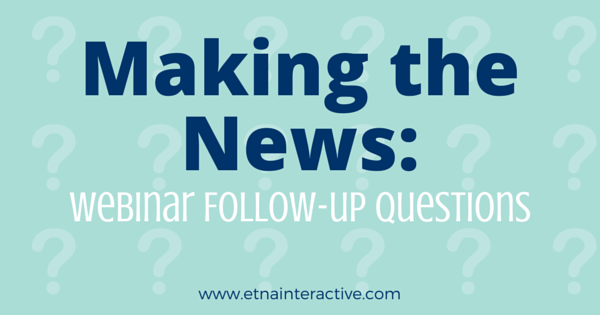We had so many great questions from February’s Making the News webinar! Although we ran out of time to answer all your questions during the webinar, I’ve asked our presenters to answer the questions we couldn’t get to in the text below.
Feel free leave a comment below if you have additional questions about earning local media coverage for your practice.
Q: What advice can you share about ensuring my pitch is genuinely newsworthy and not just self-promotion?
Nadine Tosk: Your pitch should be timely, relevant, and compelling. Understand the reporter’s beat, know your audience, tell the real news, and explain or connect your story to the topics and issues that keep the audience up at night — what they need or want to know.
Q: What role does LinkedIn play in a local media campaign?
Susan Tellem: LinkedIn, like Google+ and Facebook, can be very useful in local promotions because you can join groups that include media like Media Diplomat and other groups. But, be careful to keep the promotion factor really low and the newsworthiness high.
Q: My practice is located in a smaller market adjacent to a major metro. What strategies are best for me to earn the attention of media in the metro area?
Anne Cohen: It sometimes happens that metro outlets will pick up articles from smaller, local outlets. If you get a pick-up in a local area, send it to the major metro outlets as soon as it’s available to see if you can parlay that into bigger coverage.
Q: What are the benefits of hiring a PR professional for earning local media coverage?
Anne Cohen: The same benefits as hiring a professional to perform your aesthetic enhancements: It’s what they do full-time. PR firms have years of experience cultivating media relationships in order to create, disseminate, and follow up on pitches that garner valuable coverage.
Q: Scheduling interviews around my doctor’s OR time has proven to be a challenge. Do you have any advice on how to satisfy the reporter’s interview request without disrupting patients?
Nadine Tosk: A delicate balance indeed. We find that knowing the patient’s availability and doctor’s schedule up front helps streamline the booking process. Reporters are busy, but they are usually negotiable and cooperative (unless they’re on an extremely tight deadline).
Q: What is the best way to politely bow out of a story once the dialogue with the reporter has started? If we determine that the choice of reporter or media outlet was a mistake for one reason or another, how do you politely cut contact?
Susan Tellem: A difficult question. I think the best way to say this is that the story does not seem to be the best fit for the doctor and you have to bow out — keep it short and sweet. Suggest another story to get the reporter interested.



Leave a Comment